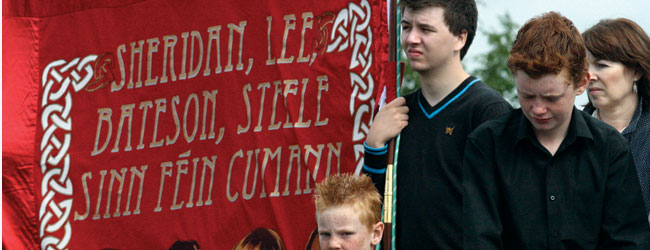9 September 2011
Derry and Antrim remember Tommy Donaghy
 SOUTH DERRY republican Tommy Donaghy was remembered on Sunday 21st August when hundreds of republicans from across Counties Derry and Antrim marched through Kilrea and along the Drumagarner Road to his graveside at St Mary’s Chapel. They were led by a colour party from the South Derry Martyrs Band.
SOUTH DERRY republican Tommy Donaghy was remembered on Sunday 21st August when hundreds of republicans from across Counties Derry and Antrim marched through Kilrea and along the Drumagarner Road to his graveside at St Mary’s Chapel. They were led by a colour party from the South Derry Martyrs Band.
Kilrea was a once-renowned bastion of staunch unionism and on the day of Tommy’s funeral, 18th August 1991, mourners were forced to run a gauntlet of physical and verbal abuse from the scores of RUC and British Army personnel who had swamped the area.
To see our national flag flying where Union Jacks would have flown in their dozens was clearly a source of pride for those from the area who joined in the parade but this wasn’t about triumphalism – it was about equality.
However, remembering Tommy Donaghy was the reason why we gathered in Kilrea and to recount the life of a republican activist who was cut down in his prime by pro-British death squads.
Tommy was shot dead by members of a loyalist gun gang on 16th August 1991.
He had just arrived at work in the Portna Fisheries on the shores of his beloved Lough Neagh when the killers struck.
As with many of those killed by loyalists, they had been under constant surveillance and suffered harassment at the hands of the Crown forces.
Inevitably, their security files ended up in the hands of the death squads.
According to Tommy’s nephew, Seán Ledwidge, Tommy discovered he was being spied on by a British Army undercover unit. Said Seán in his tribute:
“Tommy pulled back the bushes that the Brit was hiding in and asked him if he could see him okay! The startled Brit didn’t know what to do.”
Tommy had been interned in the 1970s and was among the last of the internees to be freed in 1975.
He reported back to the IRA and was arrested on active service in 1977.
When sentenced to 19 years’ imprisonment he joined his comrades on the Blanket and No-Wash Protest in the H-Blocks of Long Kesh. He was released 11 years later, in July 1988.
Immediately Tommy joined the John McGinn Sinn Féin Cumann in his local area and became a driving force in the political arena, taking a keen interest in issues relating to ongoing prison struggles.
Tommy was the thirteenth member of the party to be killed by British forces and their loyalist allies. Four were to die in 1991. Eddie Fullerton was shot dead in his home in Buncrana, County Donegal, in May.
Just four days prior to Tommy Donaghy’s killing, loyalist assassins shot dead Pádraig Ó Seanachain near Aghyaran, not far from Castlederg in County Tyrone.
On the morning of Pádraig’s killing, at 8.30am on Monday 12th August, the RUC were spotted near the ambush site.
Then, a month after Tommy was killed, on 16th September, Councillor Bernard O’Hagan was gunned down as he arrived for work at Magherafelt College.
In his address at Tommy Donaghy’s commemoration, Francie Molloy, the main speaker on the day, reminded the crowd of the political context of the campaign of assassination directed against republicans in particular and nationalists in general.
“In almost all of these cases, information on the victims had come from British Crown forces files.
“The killings could not be divorced from the campaign of vilification, censorship and misrepresentation of Sinn Féin or from the multi-faceted efforts by anti-republican elements to demonise Sinn Féin.”
These killings were taking place at a time when the foundation stones of the Peace Process were being laid and it is clear the British were attempting to terrorise republicans and weaken Sinn Féin. Clearly, their strategy has failed and failed miserably.
Follow us on Facebook
An Phoblacht on Twitter
Uncomfortable Conversations

An initiative for dialogue
for reconciliation
— — — — — — —
Contributions from key figures in the churches, academia and wider civic society as well as senior republican figures




